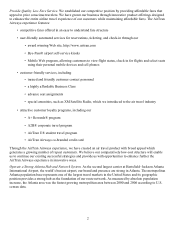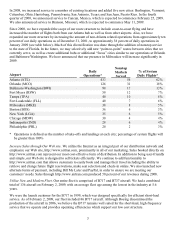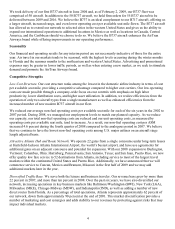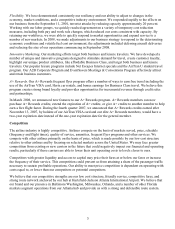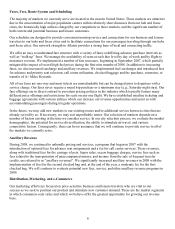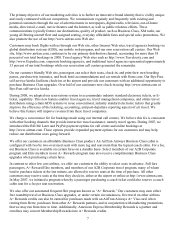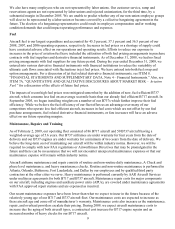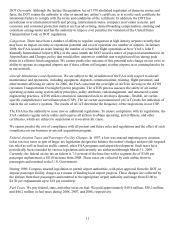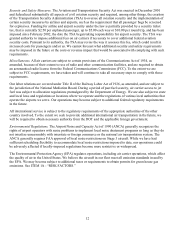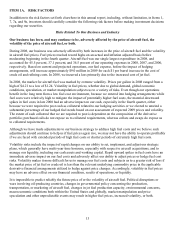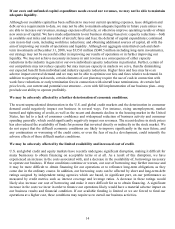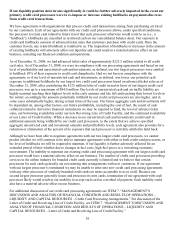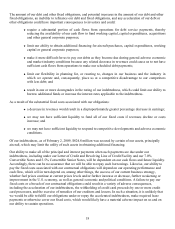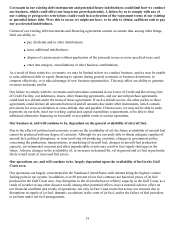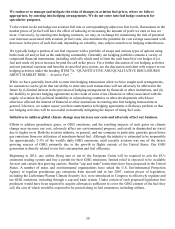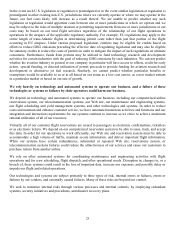Airtran 2008 Annual Report Download - page 19
Download and view the complete annual report
Please find page 19 of the 2008 Airtran annual report below. You can navigate through the pages in the report by either clicking on the pages listed below, or by using the keyword search tool below to find specific information within the annual report.DOT Oversight. Although the Airline Deregulation Act of 1978 abolished regulation of domestic routes and
fares, the DOT retains the authority to alter or amend any airline’s certificate or to revoke such certificate for
intentional failure to comply with the terms and conditions of the certificate. In addition, the DOT has
jurisdiction over international tariffs and pricing, international routes, computer reservation systems, and
economic and consumer protection matters such as advertising, denied boarding compensation, smoking and
codeshare arrangements and has the authority to impose civil penalties for violation of the United States
Transportation Code or DOT regulations.
Congestion. There have been a number of efforts to regulate congestion at high density airports recently that
may have an impact on entry or expansion potential and cost of operation at a number of airports. In January
2008, the FAA issued an order limiting the number of scheduled flight operations at New York’s John F.
Kennedy International Airport (JFK); in the same month the DOT issued a notice of proposed amendment to its
Airport Rates and Charges policy that would allow airports to establish non-weight based fees during peak
hours in a effort to limit congestion. We cannot predict the outcome of this potential rule change on our costs or
ability to operate in congested airports nor if these efforts will migrate to other airports in or contemplated to be
in our network.
Aircraft Maintenance and Operations. We are subject to the jurisdiction of the FAA with respect to aircraft
maintenance and operations, including equipment, dispatch, communications, training, flight personnel, and
other matters affecting air safety. In 2006, the FAA converted the oversight of AirTran Airways to the ATOS
(Aviation Transportation Oversight System) programs. The ATOS process assesses the safety of air carrier
operating systems using system safety principles, safety attributes, risk management, and structured system
engineering practices. ATOS utilizes structured, automated tools to develop a dynamic, flexible, air carrier-
specific comprehensive surveillance plan (CSP). The air carrier assessment tool (ACAT) looks for indicators of
risk in the air carrier’s systems. The results of ACAT determine the frequency of the inspections in our CSP.
The FAA has the authority to issue new or additional regulations. To ensure compliance with its regulations, the
FAA conducts regular safety audits and requires all airlines to obtain operating, airworthiness, and other
certificates, which are subject to suspension or revocation for cause.
We cannot predict the cost of compliance with all present and future rules and regulations and the effect of such
compliance on our business or aircraft acquisition program.
Federal Aviation Taxes and Passenger Facility Charges. In 1997, a law was enacted imposing new aviation
ticket (excise) taxes as part of larger tax legislation designed to balance the nation’s budget and provide targeted
tax relief as well as fund air traffic control, other FAA programs and airport development. Such taxes have
periodically been extended by various legislation and currently are authorized through March 31, 2009.
Currently, the federal excise tax on tickets is 7.5 percent of the base fare with a segment fee of $3.60 per
passenger enplanement, a $0.10 increase from 2008. These taxes are collected by each airline from its
passengers and remitted to the U.S. Government.
During 1990, Congress enacted legislation to permit airport authorities, with prior approval from the DOT, to
impose passenger facility charges as a means of funding local airport projects. These charges are collected by
the airlines from their passengers and remitted to the appropriate airport authority and range from $2.00 to
$4.50 per enplanement up to $18 per round trip.
Fuel Taxes. We pay federal, state, and other taxes on fuel. We paid approximately $49.4 million, $50.2 million,
and $46.2 million in fuel taxes during 2008, 2007, and 2006, respectively.
11



